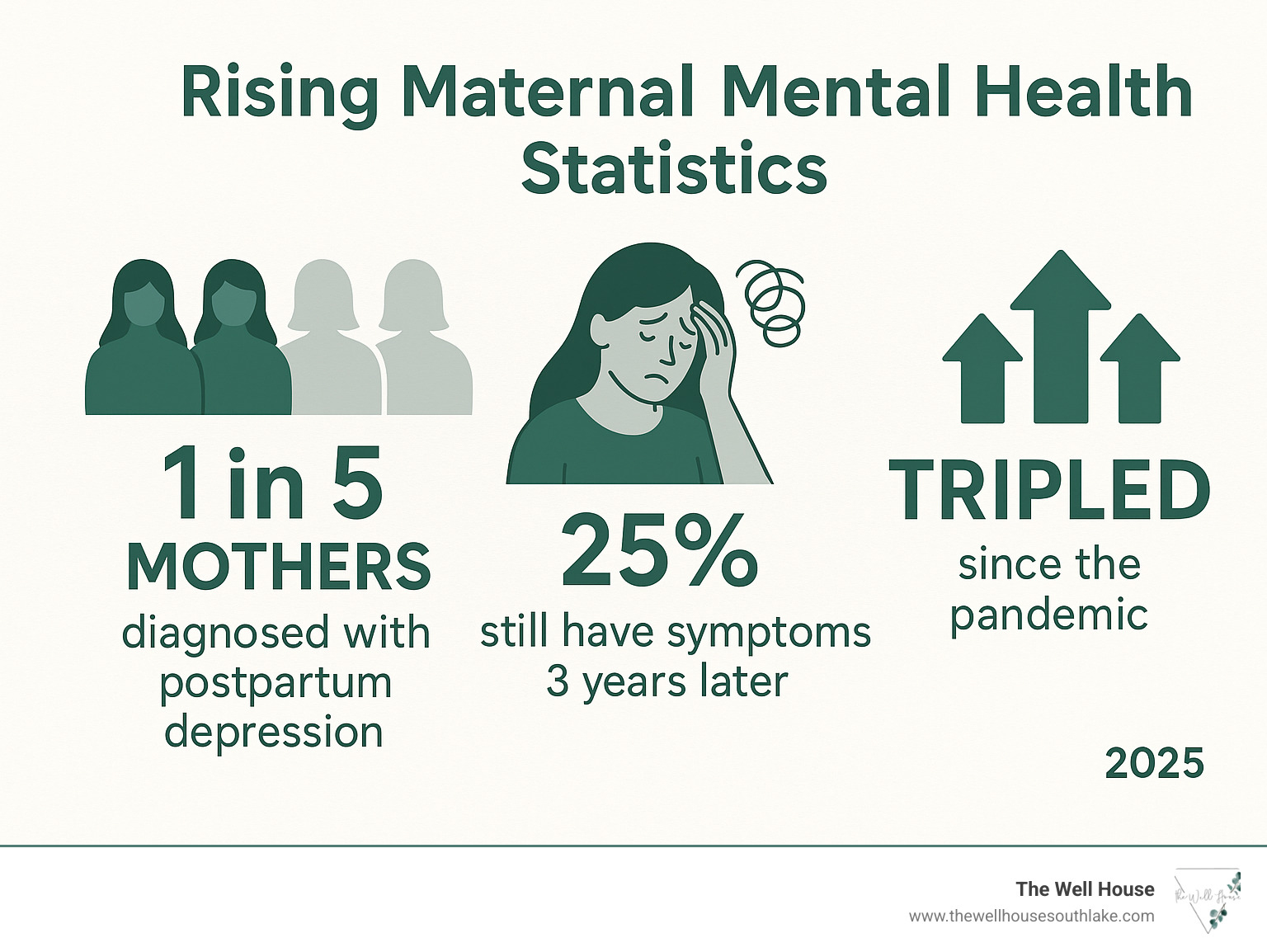The Ultimate Guide to Understanding Mother Therapy
Why Mother Therapy Matters More Than Ever
Mother therapy is specialized mental health support for women navigating the complex journey of motherhood. A maternal health therapist provides custom support for the unique challenges mothers face.
What is Mother Therapy?
- Therapeutic support for maternal mental health challenges
- Addresses issues like postpartum depression, anxiety, identity shifts, and burnout
- Focuses on individual healing and strengthening family bonds, where a therapist for mother and daughter can be beneficial
Common Issues Addressed:
- Postpartum depression and anxiety
- “Mom guilt” and perfectionism
- Identity loss and relationship strain
- Healing intergenerational trauma (the “mother wound“)
- Building secure attachment with children
Key Benefits:
- Professional, non-judgmental support
- Evidence-based coping strategies
- Improved family dynamics and child outcomes
- Breaking cycles of generational trauma
The statistics are stark: 1 in 5 mothers are diagnosed with postpartum depression, and since the pandemic, symptoms of postpartum depression and anxiety have tripled. Many mothers still hesitate to seek help, viewing therapy as a luxury.
The truth is simple: caring for your mental health isn’t selfish—it’s essential. When mothers thrive, families benefit.
Motherhood brings incredible joy alongside overwhelming challenges. The sleepless nights, constant demands, and identity changes can leave even the strongest women feeling lost. That’s where mother therapy steps in—not as a last resort, but as a powerful tool for growth and healing.
I’m Jennifer Kruse, a Licensed Professional Counselor Supervisor specializing in women’s issues and motherhood support. I’ve dedicated my career to helping mothers steer the complexities of their journey, believing every woman deserves compassionate support.

Why Mother Therapy is Essential for Modern Maternal Well-being
While often portrayed with a rosy glow, motherhood is a constant balancing act. The reality for many mothers involves an “invisible load” of responsibilities, societal pressures, and a dramatic identity shift. The constant demands, sleep deprivation, and overwhelming sense of responsibility can take a significant toll on a mother’s mental and emotional well-being. This is why mother therapy is not just beneficial, but essential for modern maternal well-being.
The statistics underscore the urgent need for specialized support. We know that 1 in 5 mothers are diagnosed with postpartum depression (PPD), and alarmingly, 25% of them still experience symptoms three years later. The impact of recent global events has intensified these challenges, with PPD and PPA (postpartum anxiety) symptoms having tripled since the pandemic. These numbers paint a clear picture: mothers are struggling and need professional, targeted help.
At The Well House, we understand these unique challenges. We offer dedicated postpartum support for new moms because we believe no mother should have to steer this journey alone.
Understanding the unique pressures of motherhood
The journey into motherhood is a profound change known as “matrescence.” This period involves a significant identity shift, as a woman’s role as a mother becomes primary. This can lead to confusion, grief for her former self, and a struggle to find her individuality. The emotional rollercoaster is fueled by hormonal fluctuations, sleep deprivation, and intense childcare demands, which can strain relationships. For many, career changes add another layer of identity crisis and financial stress. This highlights why specialized support like mother therapy is so crucial.
How specialized mother therapy provides targeted support
Specialized mother therapy provides a lifeline. Unlike general therapy, it offers a space where mothers feel truly seen because the therapist is attuned to the specific nuances of maternal mental health. This creates a safe, non-judgmental environment to explore feelings of guilt, overwhelm, or inadequacy. Therapy offers validation, reminding mothers their struggles are real and common. Therapists provide practical coping strategies to manage stress and anxiety, helping mothers build resilience to steer challenges more effectively. It’s about empowering mothers to thrive, which is why we believe mom therapy is essential for when life feels out of control.
Common Challenges Addressed and Deeper Wounds Healed
Motherhood, despite its beauty, brings unique challenges that can chip away at a mother’s well-being, leading to deep emotional struggles and feelings of overwhelm. You may have felt the pang of “mom guilt,” wondering if you’re doing enough, or the explosive frustration of “mom rage” that stems from exhaustion. Many mothers also experience profound burnout, sensory overstimulation, and deep isolation, even when surrounded by family. The societal push for perfectionism makes it tough to accept your authentic self and enjoy the journey.
These struggles are often intertwined and can worsen conditions like postpartum depression and anxiety. At The Well House, we understand this intricate web of emotions. That’s why we offer dedicated postpartum support to help with depression and anxiety—because you don’t have to steer these feelings alone.
Healing the “Mother Wound” and Intergenerational Trauma
Beyond daily challenges, many women carry deeper burdens from their own upbringing, often called the “mother wound.” This refers to the emotional scars from a complex relationship with one’s own mother. It’s not about blame, but about recognizing unmet emotional needs or unresolved experiences that shape who you are. This wound can manifest as low self-esteem, relationship struggles, or a harsh inner critic.
A related concept is “Mother Hunger,” a term by Kelly McDaniel describing a deep longing for nurturing, protection, and guidance you may not have fully received. Healing involves acknowledging these past experiences, grieving what was missing, and actively “reparenting” yourself. This means giving yourself the acceptance and comfort you needed. This process is powerful for breaking cycles of intergenerational trauma, ensuring unhealthy patterns aren’t passed down. We are here to help you find a mother wound therapist to guide you through this healing journey.
Fostering Secure Attachment with Your Children
Your well-being as a mother directly impacts your ability to form a secure bond with your child. Attachment theory explains how these early relationships shape our capacity for connection. When a mother is struggling with her own mental health, it can affect her ability to be consistently present and attuned to her baby’s needs.
The wonderful news is that healing is always possible. Therapy helps mothers process their own experiences, unlearn old coping strategies, and build healthier connections with their children. By tending to your own emotional landscape, you become more present and responsive, fostering a secure attachment. This acts as a protective shield for your child, promoting their healthy development and emotional resilience. Support can repair any ruptures and build a strong foundation. We also offer Mommy and Me Therapy to nurture this vital connection.
Key Therapeutic Approaches and Their Benefits for Moms
When you explore mother therapy, it’s helpful to know there are many paths to healing. At The Well House, our goal is to find the approach that resonates with you, creating a personalized path toward well-being.
Here are some of the most effective approaches for moms:
- Cognitive-Behavioral Therapy (CBT) is a practical approach that helps you identify and change unhelpful thought patterns. It provides hands-on strategies to manage anxiety and depression, giving you more control.
- Mindfulness-Based Therapy blends talk therapy with mindfulness practices. It helps moms reduce stress, become more self-aware, and stay present, which is especially helpful for managing overstimulation.
- Eye Movement Desensitization and Reprocessing (EMDR) is a specialized therapy for processing distressing memories, such as a difficult birth experience or past trauma, reducing their emotional impact.
- Psychodynamic Therapy explores how past experiences, especially early relationships, shape your current feelings and behaviors. It’s a great way to gain insight into long-standing patterns and heal the “mother wound.”
- Internal Family Systems (IFS) helps you understand the different “parts” of yourself. By fostering self-compassion and inner harmony, IFS guides you toward a more integrated and peaceful sense of self.
- Acceptance & Commitment Therapy (ACT) focuses on living a life aligned with your values, even with difficult thoughts and feelings. It uses acceptance and mindfulness to help you steer motherhood with more purpose.
We believe in empowering you with knowledge, which is why we’ve put together The Ultimate Guide to Therapy Options for Moms to help you explore your choices.
Attachment-Based Therapy for Deeper Connection
Attachment-based therapy is a particularly powerful approach for mothers. It guides you to understand how your early life experiences shaped the way you connect with others, especially your own child. By exploring your attachment style, you can uncover insights into your parenting patterns and any bonding challenges.
This type of mother therapy is valuable for healing relational trauma. It helps you process past hurts and build healthier, more secure ways of connecting. The beautiful outcome is a stronger, more secure bond with your child that benefits you both for a lifetime. If you’re curious, you can take a quiz here and find out your attachment style.
Comparing Therapeutic Approaches for Mothers
| Therapy Type | Best For… | Key Benefit |
|---|---|---|
| CBT | Changing negative thought patterns, anxiety | Practical, skills-based tools |
| Attachment-Based | Healing relational wounds, improving bonding | Strengthens parent-child connection |
| EMDR | Processing past trauma (birth trauma, etc.) | Resolves distressing memories |
| Mindfulness-Based | Reducing stress, overstimulation, reactivity | Increases present-moment awareness |
Finding and Embracing Therapy in Your Life as a Mom
It’s normal to have questions or hesitations about starting mother therapy. Many moms feel they “should” handle everything themselves or that there’s no time. But seeking support isn’t a sign of weakness; it’s a profound act of strength. Think of therapy as an essential piece of your well-being puzzle. With options like virtual sessions, integrating therapy into your busy life is more accessible than ever. It’s an investment that pays dividends for you and your family. When you’re ready, we can help you find a dedicated Mom Therapist who understands your journey.
Debunking Common Misconceptions
Let’s tackle some common thoughts that might hold you back:
- “Therapy is for the weak.” In reality, choosing therapy is brave. It shows you’re committed to growing and healing. It takes immense strength to look inward and ask for support.
- “I don’t have time.” We get it! A mom’s schedule is packed. That’s why many therapists offer flexible and virtual sessions that fit into your life without the commute. Even a short session can make a huge difference.
- “It’s too expensive.” While therapy is an investment, many options can make it more affordable. It’s worth discussing payment plans or checking your insurance coverage. Consider it an investment in your long-term mental health.
- “I should handle this on my own.” Motherhood doesn’t come with an instruction manual. A therapist is a trusted guide, offering tools and insights so you don’t have to carry the weight of the world alone.
- “Talking doesn’t help.” Therapy is more than just “talking.” It’s an active process with a trained professional who provides proven strategies and tools to help you make positive, lasting changes.
Practical Self-Care Strategies to Complement Therapy
While mother therapy provides deep healing, its benefits shine when paired with consistent self-care. These are vital practices for your well-being:
- Prioritize sleep: Even small improvements can significantly boost your mood and resilience.
- Schedule “me time”: Just 15-30 minutes a day for yourself can replenish your energy.
- Practice mindfulness & deep breathing: Simple exercises can reduce stress and increase your ability to stay present.
- Delegate tasks and ask for help: Lean on your partner, family, or friends. Asking for help is a sign of strength.
- Nurture your own friendships: Connections with other adults can combat isolation and provide vital support.
- Move your body gently: Physical activity, like a short walk, can release endorphins and improve your mood.
The Ripple Effect: How a Healthy Mom Transforms a Family
When a mother prioritizes her mental and emotional well-being, the positive impact extends to her entire family. A supported, emotionally balanced mom is better equipped to connect with her children and partner, creating a ripple effect of health and happiness. This isn’t just a nice idea; it’s backed by science. Studies show that when mothers receive therapy, their parenting improves, and their children’s development benefits. A mom who can manage her own feelings teaches her kids how to handle theirs, modeling emotional intelligence and fostering healthier family relationships.
It’s a beautiful cycle: healthy moms help create healthy families. That’s why we see mother therapy as a powerful investment. For more on this, you can dive into research showing therapy for moms benefits their kids. We also understand every family bond is unique, which is why we offer specialized support like therapy for mother and daughter relationships.
Strengthening the Couple and Co-Parenting Relationship
Motherhood can strain a couple’s relationship. The shift in focus, sleepless nights, and new responsibilities often lead to communication issues. Mother therapy, especially when it includes couples or co-parenting support, can work wonders. It provides a safe space for partners to talk openly about the division of labor (including the “mental load”), improve communication, and address intimacy struggles. Therapy helps couples reconnect as partners, not just co-parents. When the couple’s bond is stronger, moms feel more supported, boosting their mental health and parenting confidence. We also offer specialized support like Mom and Son Therapy to nurture all family relationships.
Frequently Asked Questions about Mother Therapy
We understand you might have questions about mother therapy. It’s normal to wonder if it’s the right step. Here are some common inquiries we receive:
How do I know if I need mother therapy?
You don’t need a formal diagnosis like postpartum depression (PPD) to benefit from mother therapy. Consider it a tool for support if you’re experiencing persistent feelings that won’t go away. Ask yourself:
- Am I feeling a persistent sadness or anxiety that makes it hard to enjoy things?
- Do I feel constantly overwhelmed, like the demands of motherhood are crushing me?
- Am I having difficulty bonding with my baby or feeling emotionally detached?
- Are my relationships with my partner, family, or friends more strained than usual?
- Do I feel like I’ve lost myself and no longer recognize who I am outside of being a mom?
- Are my usual coping skills not enough anymore?
If any of these resonate, seeking support is a positive and proactive step.
What’s the difference between talking to a therapist versus a friend?
Friends offer invaluable support, but a therapist provides a unique, professional service. While friends give advice based on their own experiences, a therapist is a trained, impartial professional who helps you find your own solutions.
A therapist offers:
- Professional expertise: They use evidence-based techniques to facilitate change and teach practical coping strategies.
- Unbiased perspective: A therapist offers a non-judgmental space, free from personal history or expectations.
- Confidentiality: Therapy is a deeply safe space to explore your most vulnerable thoughts without fear of judgment.
- Focused time: Therapy provides dedicated time solely for your needs and well-being.
Can therapy help even if I don’t have postpartum depression?
Absolutely. Mother therapy is not just for clinical conditions. It’s incredibly beneficial for any mother navigating the transitions and stressors that impact anyone.
Therapy can be a fantastic resource for:
- Identity shifts: Navigating the profound changes to your sense of self after becoming a mother.
- Burnout: Preventing and recovering from the deep exhaustion that comes with constant demands.
- Relationship stress: Improving communication with your partner and family as your family dynamic shifts.
- Parenting questions: Gaining confidence and strategies for navigating different developmental stages.
- Healing past wounds: Addressing unresolved issues from your own childhood that may impact your parenting.
Many mothers seek therapy simply to gain clarity, build resilience, and develop healthier coping mechanisms. It’s a space for personal growth that helps you not just survive motherhood, but truly thrive in it.
Insurance & Payment Options at The Well House Southlake
At The Well House Southlake, we believe that quality mental health care should be both accessible and affordable. Whether you’re seeking therapy, couples counseling, or online sessions, our goal is to make it easy for you to access therapy that takes insurance and supports your unique needs.
We currently accept:
- Blue Cross Blue Shield (BCBS)
- Aetna
- UnitedHealthcare (UHC)
- Self-Pay and Out-of-Network Options
If you’re exploring counseling that takes insurance or need help verifying your coverage, our team will guide you through each step — from confirming your benefits to booking your first session. We’re committed to making your experience simple and stress-free, so you can focus on what matters most: your well-being.
Conclusion
The journey of motherhood is an incredible mix of immeasurable love and unique challenges. It’s normal to feel overwhelmed, isolated, or stretched thin. Every mom feels this at times.
Reaching out for mother therapy isn’t a sign of weakness; it’s a profound act of courage and self-love. It’s an investment in yourself that pays dividends in your own well-being and in the health and happiness of your entire family. When you prioritize your needs, you create a ripple effect of positive change.
Please know this: you are not alone in your struggles. The challenges you face are valid, and support is available. At The Well House, we are committed to supporting mothers through every stage of their journey. We offer personalized mental health services with a holistic approach, focusing on mind, body, and spirit. Our diverse team provides compassionate and effective telehealth options, alongside in-person sessions in Southlake, Westlake, Grapevine, Roanoke, and Trophy Club, TX.
Your path to a healthier, more joyful motherhood begins with that first step. We are here to walk alongside you, offering understanding and guidance.
Begin your journey with therapy for moms in Southlake, Texas














